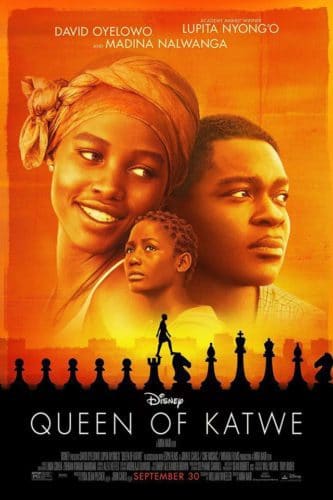It is very rare that a preteen chess prodigy takes the world by storm, but that is exactly what Phiona Mutesi did. Her journey to becoming a national champion and eventually a Woman Candidate Master, is the story filmmaker Mira Nair tells in “Queen of Katwe,” a biographical sports drama that is imbued with a sense of authenticity rarely seen in this day and age.
Based on Tim Crothers’ 2012 non-fiction book of the same name, the film stars newcomer Madina Nalwanga as Phiona, a young girl living in the slums of Kampala, Uganda who spends her days selling ears of corn in order to support her widowed mother Harriet (Lupita Nyong’o) and three siblings. While wandering the streets one fateful afternoon, Phiona is introduced to Robert Katende (David Oyelowo), a missionary dedicated to empowering the local children by teaching them how to play chess.
Mesmerized by the game, she quickly shows potential and finds herself rising through the ranks in local chess competitions. But when she sets her sights on becoming a chess grandmaster, Phiona is forced to choose between continuing to care for her family and following her dreams.
Unlike the biopics that have dominated the box office over the past several years, which took an unfathomably grand-scale approach by focusing on figures ranging from Dr. Martin Luther King Jr. to Stephen Hawking, “Queen of Katwe” elects to play it small-scale. To accomplish this, Nair chooses to concentrate on both Phiona and the community in which she was raised. By choosing to shoot most of the film on location, the Indian-American director makes viewers feel as though they have been thrust into a village that is filled with color and life even when the going gets rough.
The main cast is nothing short of superb. Oyelowo uses his own brand of charisma in bringing Robert to life, transforming the coach/father-figure stereotype into a character far more solid than the coach/father-figures seen in “Million Dollar Arm” and “McFarland, USA.” Nyong’o equally shines as Harriet, conveying a fierce dignity and a definite vulnerability that captivate viewers from the minute she appears onscreen for the first time. But it is Nalwanga who hits it out of the park, bringing life and depth to a girl who would capture the hearts of millions.
Even after all this praise, the film’s flaws are not negligible. William Wheeler’s script borders on the edge of being trite more than once, spouting cliched bits of dialogue that dampen the mood. Furthermore, the running time feels longer because it feels as though Nair lengthened certain scenes in order to add more impact to the final product. This makes it somewhat difficult to become invested in the plot, but they are ultimately inconsequential to the film as a whole.
Offering a fresh perspective on the sports biopic, “Queen of Katwe” allows viewers witness the events that helped a young woman become one of the next great names in sports history.




